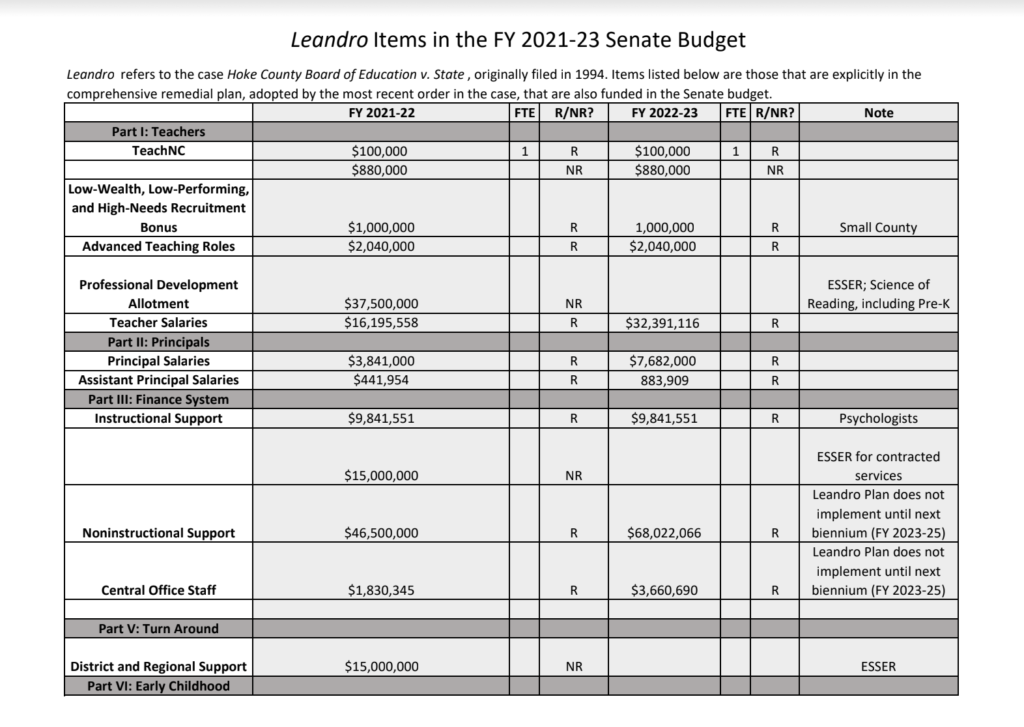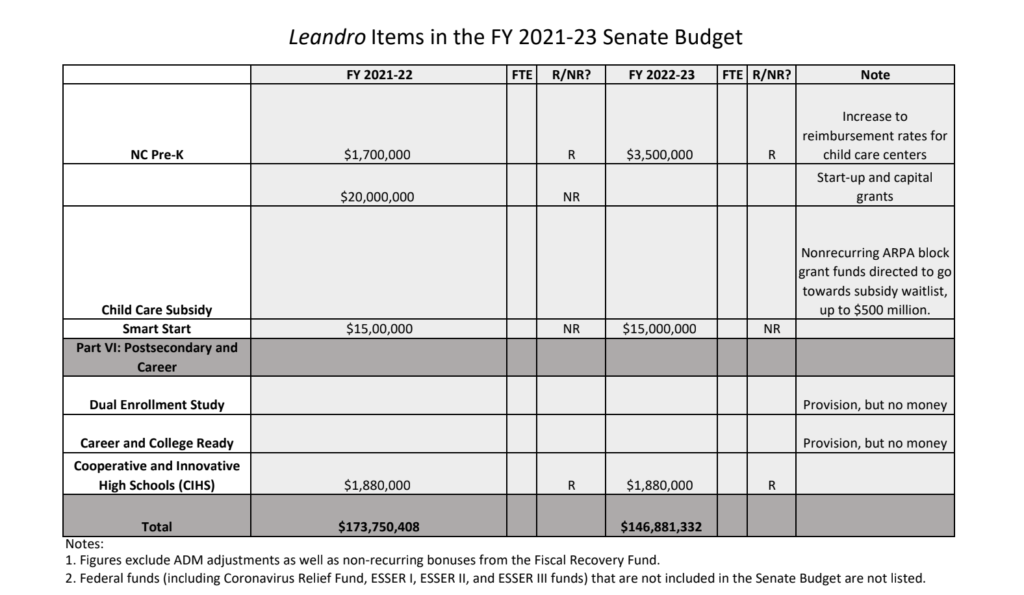
|
|
Update 9:38 a.m. June 25: The budget passed its third and final reading. It goes now to the House.
The Senate budget passed its second of three readings today —32-18 — with Republicans rejecting proposed changes from Democratic lawmakers on topics ranging from teacher pay to the Leandro court case.
The total general fund budget proposed by the Senate includes about $25.7 billion in 2021-22 and about $26.6 billion in 2022-23. Of that, K-12 education makes up about $10.4 billion in the first year and $10.5 billion in the second year. After the Senate finishes tomorrow, the House will develop its own budget plan before the two chambers haggle over the details.
Read more about what’s in the budget for K-12 here.
Read more about what’s in the budget for community colleges here.
Leandro
In introducing the education section of the two-year spending plan, Sen. Deanna Ballard, R-Watauga, referenced a theme familiar to all who have followed the long-running Leandro case: the state’s obligation to provide students the opportunity for a sound, basic education. She said the Senate budget would do that by focusing on students, and she noted the additional money in the budget for things like literacy. She equated literacy with equity.
While she referenced the Leandro court case, she did not reference the comprehensive eight-year plan that a court has ordered the state to follow. In a response to a question in a Senate appropriations committee earlier this week, General Assembly staff provided the following document to lawmakers showing how the Senate budget plan does or does not align with that comprehensive plan.


The Supreme Court of North Carolina, in its landmark Leandro v. State of North Carolina decision, affirmed the fundamental right of every child to have access to a sound, basic education. The courts also ruled that North Carolina was not meeting this constitutional requirement. The courts and parties have been trying to figure out how to make this right ever since — the comprehensive remedial plan is the most ambitious attempt made yet to do so.
Sen. Don Davis, D-Pitt, brought up Leandro, pointing out that North Carolina students were having problems even before the COVID-19 pandemic.
“What I see before us today is a step … in trying to deliver on the constitutional requirements to provide a sound, basic education to the students of the state,” he said.
He “commended” the funds in the budget that relate to the Leandro case but said more was necessary. He then put forth an amendment that would address a number of items in the Leandro comprehensive plan, including teacher preparation, recruitment, and retention.
The amendment was “tabled” by Senate Republicans, however, meaning it didn’t come up for a vote.
Teacher pay
The Senate budget includes just a 1.5% salary increase for teachers in each year of the biennium for a total of 3%. That is an average pay increase and includes step increases for teachers who would have gotten them anyway.
That is not all that teachers will be getting, however. State employees making less than $75,000 will get a $1,500 bonus and those making more will get $1,000 bonuses. All of that money comes from federal relief funds, and it includes teachers.
In addition, teachers will get a $300 bonus “from repurposed state funds previously appropriated for performance bonuses that cannot be paid due to COVID-19 related data issues,” according to a press release.
The North Carolina Association of Educators (NCAE) sent out a press release criticizing the Senate pay proposal this week.
“When presented with an added $6.5 billion in unexpected revenue, the N.C. Senate has opted to reward North Carolina educators for working non-stop to support our students through the most difficult school year in history with a pitiful 1.5 percent annual pay raise,” said NCAE President Tamika Walker Kelly in an emailed statement. “This proposed budget shows that corporate tax cuts take priority over North Carolina students yet again.”
Democratic Governor Roy Cooper, who proposed an average 10% pay raise over two years for teachers in his budget proposal, spoke out against the Senate budget plan on Twitter this week.
Sen. Michael Garrett, D- Guilford, put forth an amendment today that would increase the budget’s pay raise to what the governor recommended: 10% average increase over two years.
“A three percent raise over two years is a slap in the face,” he said.
Republicans again tabled the amendment.
Other amendments
Democrats attempted to move a number of other amendments into the bill, including:
- Sen. Wiley Nickel, D-Wake, proposed an amendment that would expand eligibility for NC-Pre-K to all three-year-olds in the state. Right now, the program is for four-year olds whose family is at or below 75% of the state median income. Nickel’s amendment would have also eliminated this and any other restriction on eligibility. These changes would have been paid for by rolling back some of the Republican tax-cut plans.
- Sen. Natalie Murdock, D-Durham, praised Senate lawmakers for putting a $13 an hour minimum wage into the spending plan for non-certified public school staff. She put forward an amendment, however, to raise that to $15 an hour, in line with the minimum wage of most state employees.
- Sen. Jay Chaudhuri, D-Wake, put forward an amendment that would restore Master’s pay for educators. Republicans eliminated Master’s pay back in 2013.
All of these amendments were also tabled by Republicans.
The Senate will have its final vote on the budget tomorrow. Stay tuned to EdNC.org for details.



